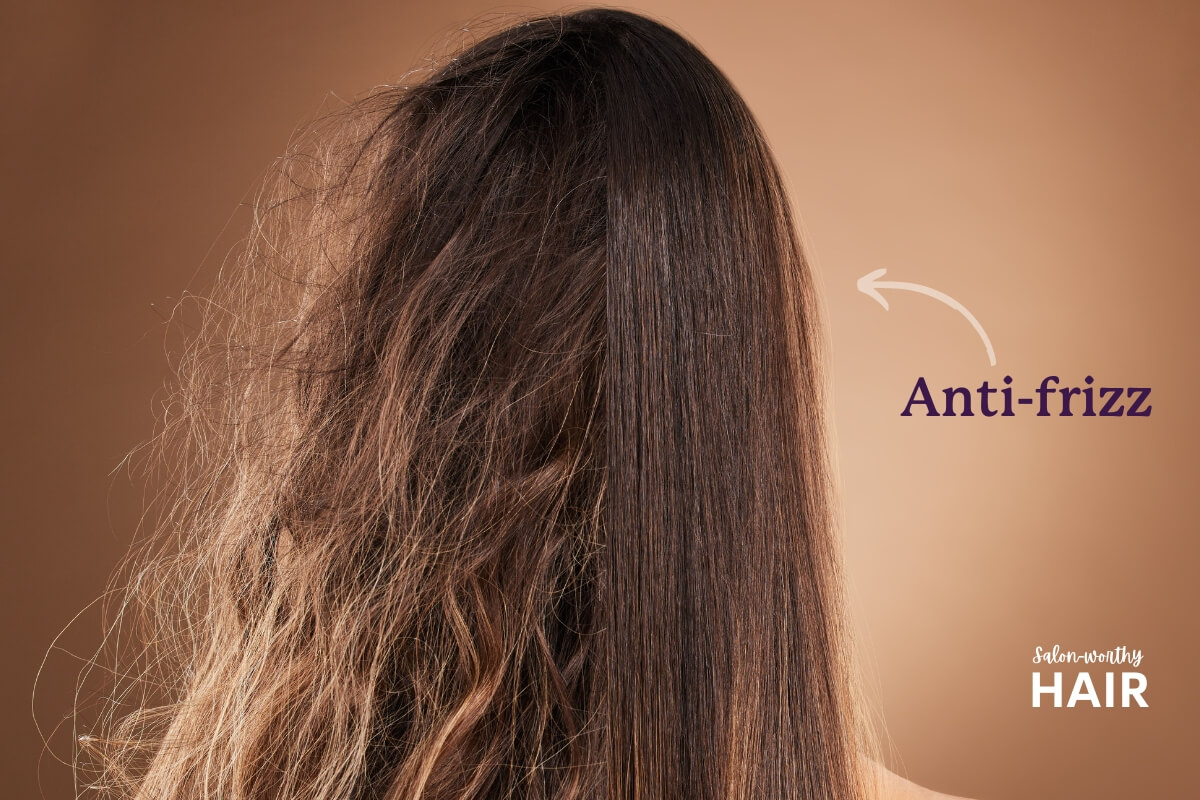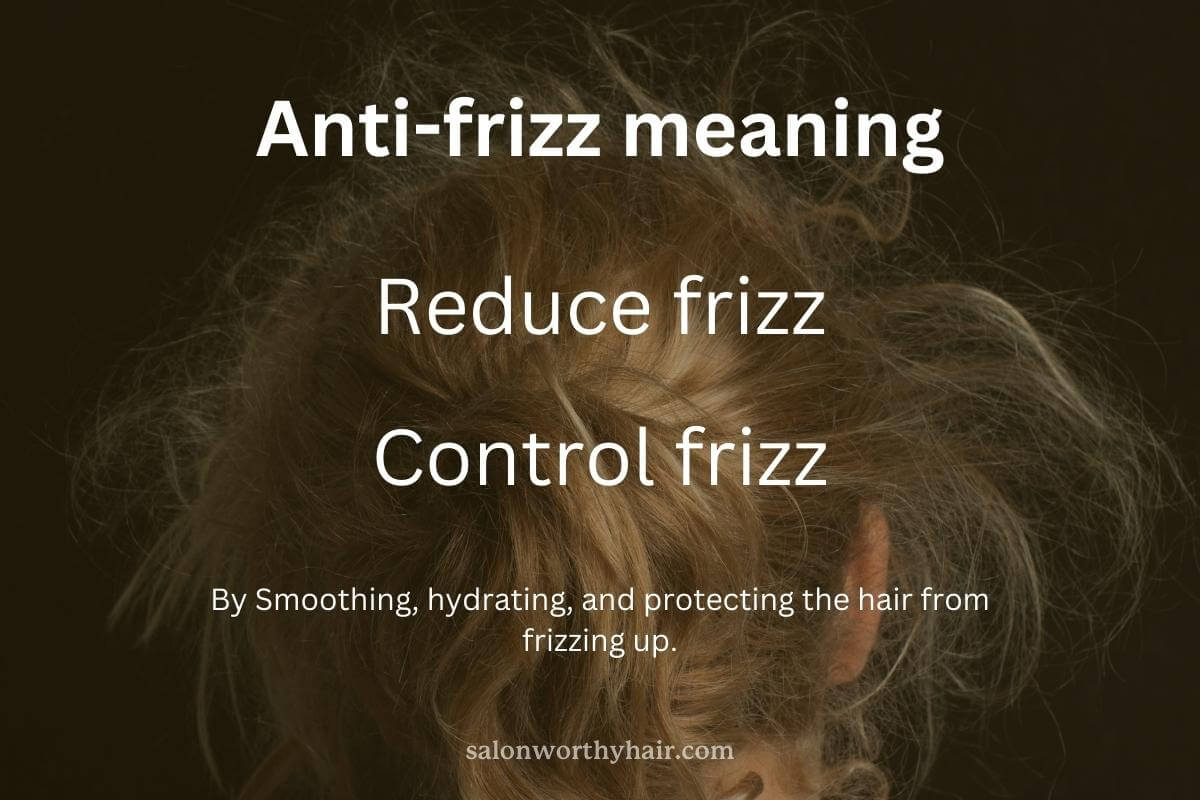Anti-frizz – What Does It Mean and How Products and Treatments Can Help?
Updated on
This post may contain affiliate links. As an Amazon Associate, we may earn from qualifying purchases.

Anti-frizz refers to hair care products and treatments designed to reduce or eliminate frizz, balance moisture, and protect the hair from environmental influences such as humidity, wind, and sun.
Frizz means hair strands that do not align but curl, kink, or puff out in multiple directions, leading to a fuzzy or messy appearance. Frizzy hair can be described as unruly hair that resists being tamed and styled into place. Several factors can contribute to frizz hair, including humidity, the use of heat styling tools, chemical hair processing, or improper hair care.
An anti-frizz is specifically designed to address frizz-related issues in hair. Its main purpose is to smooth and condition the hair, effectively reducing and preventing frizz. By making the hair’s surface flat and smooth, it creates a sleek appearance, while infusing hydrating agents to improve the hair shaft’s moisture levels.
Some anti-frizz products offer heat protection, color protection, and natural ingredients, such as essential oils, which can also help to promote overall hair health.

How Does Anti-frizz Treatment Work?
An anti-frizz product or treatment smoothens, hydrates, and protects the hair to reduce frizz and keep hairstyles under control. The anti-frizz solution works through a series of actions, starting with the primary objective of smoothing.
The product/treatment targets frizzy hair strands to align them in an orderly fashion, which reduces the hair’s messy and chaotic appearance, giving it a more sleek, polished, and uniform look.
The smoothing effect of an anti-frizz treatment seals the cuticle layer of hair. The cuticle is the hair’s outermost layer, and when the cuticle is raised or damaged, it can cause frizz. An anti-frizz treatment aids in laying down the hair cuticles, creating a smoother, shinier surface.
Once the cuticle layer is sealed, meaning there are no gaps and holes, the hair shaft can regulate its moisture more effectively by preventing internal moisture from escaping and external moisture from absorbing. Excess moisture from the environment, particularly in humid conditions, can infiltrate the hair shaft and cause it to swell, leading to frizz. Anti-frizz treatments regulate the hair’s moisture balance, ensuring the hair shaft does not absorb excess water from the surrounding air.
Anti-frizz treatments contain special hydrating ingredients that penetrate deep into the hair’s shaft, promoting moisture within the strands and preventing dryness. Effective moisture control keeps the hair’s weight and volume in check, which, in turn, prevents frizz and unmanageability.
Weight and manageability are also vital factors addressed by anti-frizz treatments and products. These treatments and products work by smoothing and hydrating the hair, enhancing its weight and manageability, making hairstyles easier to manage. The anti-frizz products add enough weight to the hair strands to prevent them from puffing up, but not so much that the hair appears lifeless or heavy.
Many anti-frizz products also offer heat protection. The heat from styling tools can be damaging and lead to frizz. These anti-frizz treatments often form a protective layer on the hair, reducing the harmful impact of heat and maintaining the user’s hair smoothness and shine.
The effectiveness of anti-frizz treatments varies depending on hair types and their underlying health condition. For instance, curly and wavy hair types, which are more prone to frizz due to their natural characteristics (texture and dryness), might benefit more from specific anti-frizz products than straight hair. Similarly, hair damaged from chemical treatments or excessive heat might significantly improve with specialized anti-frizz treatments. Therefore, depending on the health condition of the hair and its genetic predisposition to frizz, it is essential to choose the right anti-frizz treatment with the appropriate mix of ingredients. Some anti-frizz treatments are formulated to manage dryness-related frizz, while others are more suitable for hair damage-related frizz.
Ingredients in Anti-frizz Products and Treatments
The common ingredients in anti-frizz products and treatments are:
- Silicones: Silicone is a synthetic polymer with a flexible, rubber-like consistency. It is a common ingredient in many hair care products, from shampoos and conditioners to styling products. Silicones play a significant role in providing smoothness and shine to hair. These compounds coat the hair strands, creating a smooth surface that reflects light and gives your hair a glossy appearance.
- Polymers: In hair products, polymers refer to large molecules that form a thin film on the hair, providing hold, shine, and a barrier against environmental factors like humidity. Specifically, cationic polymers have a unique ability to improve hair’s manageability and softness due to their positively charged nature, which attracts them to the negatively charged hair. These polymers can enhance the hair’s texture and provide anti-static properties, helping to reduce frizz and flyaways caused by static electricity. The presence of anti-frizz polymers ensures further protection against frizz, keeping the hair smooth and manageable.
- Anti-frizz Oils: Anti-frizz oil is a viscous liquid at room temperature, insoluble in water, often lighter in density, but soluble in organic solvents. Its unique property is its ability to reduce friction between surfaces in contact, making it an excellent lubricant. When used in hair care products, anti-frizz oil lubricates the hair shafts, smoothing the hair’s cuticle layer to prevent friction. Examples of anti-frizz oils include argan oil, sweet almond oil, and jojoba oil. These oils also condition the hair to make it softer, improve texture, and enhance manageability. Additionally, anti-frizz oil delivers essential nutrients to the hair, such as fatty acids, vitamins, minerals, and proteins.
- Hydrating Ingredients: Hydrating ingredients in hair products provide moisture retention, softness, and enhanced elasticity to the hair strands. These ingredients help replenish the moisture level in the hair. Hydrating ingredients are also known as humectants, which are substances that can attract and retain moisture from their surroundings. Common examples of humectants include Glycerin, Panthenol, Honey, Aloe Vera, Hyaluronic Acid, Sorbitol, and Propylene Glycol.
Types of Anti-frizz for Hair
Here is a list of the different types of anti-frizz for hair:
- Anti-frizz Serum: An anti-frizz smoothing serum helps to tame flyaways and soften hair. The anti-Frizz Serum is applied to damp hair after washing, but you can also use it on dry hair if needed.
- Anti-frizz Cream: Anti-frizz cream contains a high amount of silicone, which coats each hair strand with a protective layer. This coating smooths out any bumps or tangles, while also eliminating static electricity (which causes frizz).
- Anti-frizz Control Spray: The “Anti-frizz” control spray is meant to be applied all over wet or dry hair before styling, leaving behind an invisible shield against humidity. This way, you can style your hair without worrying about annoying flyaways returning!
- Leave-In Conditioner/Detangler: This specific product, referred to as the “Anti-frizz Leave-In Conditioner/Detangler,” performs exactly what its name implies – it conditions your hair while detangling it simultaneously! The leave-in conditioner and detangler make it suitable for both curly or straight styles. It helps protect against breakage due to frequent brushing when styling tools like combs or brushes come into contact with sensitive areas, such as the temples, which tend to be extra delicate due to stress-related issues, like constant tugging motions while combing through sections where the hair is particularly curly.
- Anti-frizz Shampoo: An anti-frizz shampoo is formulated to gently cleanse the hair while addressing the root cause of frizz, which is often dryness and lack of moisture. This anti-frizz shampoo contains moisturizing ingredients, such as silicones, natural oils (e.g., argan oil, coconut oil), and humectants (e.g., glycerin), to make the hair less prone to frizz after washing.
- Anti-frizz Conditioner: Anti-frizz conditioner is designed to smooth down the hair’s cuticle after shampooing. By doing so, it makes the hair easier to comb through and detangle, thereby reducing the risks of hair breakage. This specialized conditioner contains hydrating agents that replenish the hair’s moisture, preventing dryness and leaving the hair feeling noticeably softer and smoother.
- Anti-frizz Sheet: An anti-frizz hair smoothing sheet is a convenient and portable product that helps to tame frizz and flyaways on the go. This sheet is infused with lightweight oils or silicone-based serums that smooth down the hair cuticles, reducing frizz and providing a polished look. The main purpose of the anti-frizz hair smoothing sheet is to target specific areas of frizz or flyaways that need attention. To apply, gently rub or tap the sheet onto the hair, allowing the product to transfer onto the strands and provide instant smoothing effects.
- Anti-frizz Lotion: An anti-frizz hair lotion is a type of leave-in product that is lighter than creams or butters, making the lotion less likely to weigh hair down. Unlike some hair oils or serums, anti-frizz lotions often provide hydration without leaving a greasy residue, balancing moisture and lightness. The anti-frizz lotion is typically applied to damp hair before styling and is designed to provide long-lasting frizz protection throughout the day.
Benefits of Anti-Frizz for Hair
Here are the benefits of anti-frizz for hair:
- Frizz Control: Anti-frizz products reduce or eliminate frizz in the hair. By smoothing the hair cuticle to prevent moisture from infiltrating and swelling the hair strands, these products provide moisture balance and protection from external elements that can disrupt the hair’s alignment and ability to hold a smooth and orderly appearance.
- Humidity Protection: Anti-frizz products protect hair from humidity primarily by creating a hydrophobic barrier around the hair strand that prevents moisture absorption from the surrounding environment. These products often contain silicone or other water-resistant ingredients that coat the hair and shield it from the effects of humidity.
- Hair Texture Enhancement: Anti-frizz treatments enhance the natural pattern of the hair, whether it’s straight, wavy, curly, or coily. These treatments give more definition to your hair, making its pattern more prominent and visible. Moreover, anti-frizz treatments minimize frizz that can disrupt the hair’s natural pattern, leading to a more polished and sleek appearance.
- Improved Hair Shine: When hair strands are smooth, they lay flat, allowing light to reflect more uniformly off the surface, leading to the perception of shiny hair. Specifically, the use of “Anti-frizz” products provides a glossy and glassy feel to the hair, enhancing its aesthetic appeal. These Anti-frizz products contain unique ingredients that combat frizz and impart a brilliant shine to the hair, making it look healthier and more radiant.
- Improved Hair Manageability: Hair that is frizzy and unmanageable is hard to comb through, style, and manage. Anti-frizz serums, containing nourishing oils and proteins, can help tame unruly hair bto make it smooth and easier to manage.
- Long-Lasting Hairstyles: By preventing your hair from frizzing in unexpected circumstances, like high humidity, anti-frizz serums, sprays, or smoothing treatments can help keep your hairstyles looking fresh and polished throughout the day.
Anti-frizz Products and Treatments to Try
Anti-frizz hair products are designed to control, reduce, and eliminate frizz in the hair. These specialized products often contain ingredients like silicones, oils, or polymers that coat each hair strand and smooth down the hair’s cuticle, reducing frizz and giving the hair a sleek, shiny appearance.
Anti-frizz hair products also create a humidity barrier that prevents moisture absorption from the air, which is a common cause of frizz.
Besides hydrating the hair and improving manageability, these products can also provide protection from heat styling when using hair straighteners and blow dryers. They enhance shine by glossing the surface of the hair and provide fortifying nutrients that improve the health condition of the hair from the inside out.
Best anti-frizz products.Anti-frizz Treatments
Anti-frizz treatments refers to a procedure or process that is specifically designed to address frizzy hair. Unlike physical hair products, anti-frizz treatments might involve a single application of a product or a series of applications over time. In essence, a treatment refers to the use of multiple products with specific instructions, and an anti-frizz product is part of the anti-frizz treatment process.
Example of anti-frizz treatments are keratin treatments, deep conditioning treatments, and hair smoothing treatments. Anti-frizz treatments can be performed in salon or at home by following a set of instructions tailored for your specific hair type and underlying health condition.
Best anti-frizz treatments.About the Author
 Shehnaz Shirazi
Shehnaz ShiraziShehnaz Shirazi has been writing in the beauty and cosmetics industry for over 8 years, sharing her expansive hair care and beauty knowledge. Shehnaz researches and tests new hair care trends and publishes her insights here.